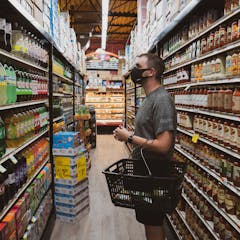
Articles on Diet
Displaying 81 - 100 of 659 articles

The Paleo Diet is popular, but research has yet to substantiate its purported health benefits. As evolutionary anthropologists, here’s why we think it’s time to leave the Paleo Diet in the past.

Humans have used turmeric for more than 4,000 years.

Lifestyle factors like physical activity, diet and sleep can lower the ‘biological age’ of your cells and tissues and reduce age-related physical decline.

Here’s what the new WHO guidelines mean for people who have switched to artificial sweeteners for health reasons.

Healthy eating campaigns tend to put forward images of nutritious foods. But science shows there is a more effective and counterintuitive way of steering people away from junk food.

Any benefit of eating ice cream can likely be explained by other factors – such as eating a healthy diet or exercising.

Does intermittent fasting have a negative or positive effect on athletic performance? At the moment, the scientific data about this is contradictory.

Sports gels and protein powders can meet the increased nutritional needs of endurance athletes in a convenient form. But they do pack downsides too.

The inequitable distribution of the benefits and harms of the food system is a violation of the constitutional right to food.

‘Omad’ is popular with many celebrities, including Bruce Springsteen.

Research has examined how ultraprocessed foods can contribute to diabetes, cardiovascular disease, cancer and mood disorders. A healthier diet is one way to use food as medicine.

Reaching for pasta or a bowl of comforting soup? Here’s how the cooler months can affect our cravings.

Ozempic uses semaglutide to mimic the role of a hormone naturally produced by the body to create feelings of fullness. Certain foods can do the same thing.

Research shows the key to changing your diet is focusing on changing eating habits and food behaviours, one at a time.

Antioxidants in salmon’s diet give the fish their distinctive colour, but internet rumours proliferate about how farmed salmon achieve the same colour.

For parents, encouraging healthy family diets for children from the time they are babies is one way to keep children’s blood sugar levels in check. The Indonesian government can do more to help too.

Australia’s food labelling system is under-performing. Here’s how we can make it more effective.

If you’ve lost weight and then put it back on, it’s not because of a lack of willpower.

More people are opting for a “social omnivore” lifestyle – could it save the planet, your health and your social life?

‘Ultra-processed’ is not just another term for junk food. It has been shown to be bad for the body and the planet – and it can be tricky to identify.
